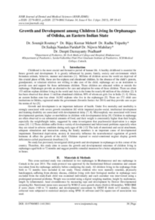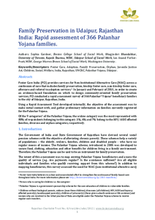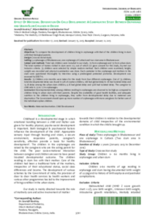childrens_living_arrangement
children_living_without_bio
Displaying 361 - 370 of 427
This study was aimed at assessing growth and developmental outcomes of children living in orphanages in Odisha, India aged birth to 72 months and to make recommendations for “possible remedial measures” for addressing poor growth and developmental outcomes for children in institutions.
A Parliamentary panel in India has recently rejected a proposal for intercountry adoptions of orphaned children, according to the article.
The Indian government has launched Standard Operating Procedures (SOPs) for the reunification and rehabilitation of children separated from their families at 20 big railway stations in the country, according to the article.
A recent police investigation in Baramati, India has revealed that a local girls’ orphanage has been running a child marriage racket, according to this article from Pune Mirror.
30 children from West Bengal, India were recently “rescued” by police during a child labour raid in the Old City. The children are now being lodged at a rescue home “with little hope of returning to their native place” as they await a First Information Report (FIR) to be issued, according to the article.
The ultimate message of a recent national adoption meeting in India was that all stakeholders should do their utmost to ensure the best interests of children are given priority and first consideration in all matters related to adoption, according to the article.
In January and February of 2015, in order to create an evidence-based foundation on which to design community-oriented family preservation services, FCI conducted a rapid assessment survey of 366 Palanhar Yojana beneficiary families in the city of Udaipur, Rajasthan, India.
This study sought to understand gender differences in potentially traumatic events (PTEs) in orphaned and separated children in 5 low- and middle-income countries (LMIC): Cambodia, Ethiopia, India, Kenya and Tanzania.
Foster Care India is launching a Manifesto to help change the way that over 1.2 billion people look after and protect children in India.
This study compares the development of children living in orphanages with that of children living in slums with their biological parents in Odisha, India.



